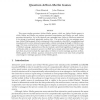1410 search results - page 50 / 282 » The Algorithmics of Solitaire-Like Games |
76
Voted
ATAL
2005
Springer
15 years 4 months ago
2005
Springer
Designing agents whose behavior challenges human players adequately is a key issue in computer games development. This work presents a novel technique, based on reinforcement lear...
NOSSDAV
2005
Springer
15 years 4 months ago
2005
Springer
We are concerned with the fundamental problem of event ordering in multiplayer peer-to-peer games. Event ordering, even without faults, requires all-to-all message passing with at...
89
Voted
COCO
2004
Springer
15 years 4 months ago
2004
Springer
This paper studies quantum Arthur–Merlin games, which are Arthur–Merlin games in which Arthur and Merlin can perform quantum computations and Merlin can send Arthur quantum in...
JELIA
2004
Springer
15 years 4 months ago
2004
Springer
Boolean games are a class of two-player games which may be defined via a Boolean form over a set of atomic actions. A particular game on some form is instantiated by partitioning ...
ECML
2003
Springer
15 years 4 months ago
2003
Springer
Abstract. Most of multi-agent reinforcement learning algorithms aim to converge to a Nash equilibrium, but a Nash equilibrium does not necessarily mean a desirable result. On the o...

